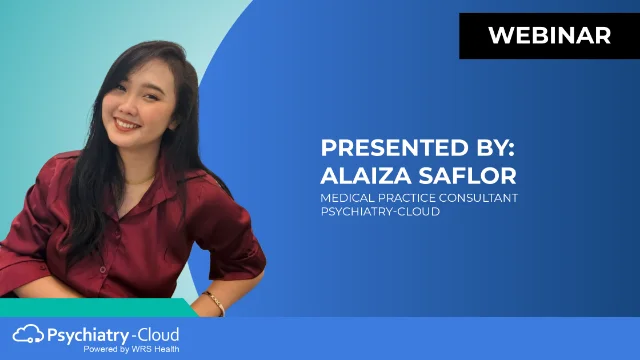Key Takeaways
- AI tools in psychiatry can reduce administrative burden and increase clinical focus.
- Value-based care becomes more achievable with real-time insights and intelligent workflows.
- Enhanced documentation, decision support, and revenue tracking support long-term success.
- Learn how AI-enabled psychiatry platforms can improve outcomes without compromising patient connection.
In psychiatric care, the provider-patient relationship is the cornerstone of healing. Yet today’s psychiatrists face growing pressure. They’re expected to juggle documentation, billing, compliance, and care coordination—often at the expense of the emotional presence their patients need most. It’s not uncommon to wonder, “Can I find a balance between the benefits of technology and connecting with patients?”
What if the answer is yes—and that behavioral health technology could actually enhance your patient interactions?
As the behavioral health industry shifts toward value-based care (VBC), expectations only intensify. Under VBC models, reimbursement is tied to tangible outcomes like symptom reduction, patient engagement, and coordinated care—not just number of visits.
Unfortunately, most legacy systems weren’t built to support this evolution. That’s where AI-enhanced psychiatry platforms make the difference.
Modern, intelligent solutions are designed to automate routine administrative tasks, deliver real-time clinical insights, and streamline operations—freeing clinicians to focus more fully on patient care. With the right tools, psychiatrists can bridge the gap between technological progress and human connection. The result? Better outcomes, higher satisfaction, and a practice that thrives in today’s value-driven environment.
Here are three key ways AI solutions help providers deliver on the promise of value-based psychiatry.
Table of Contents
Reclaiming Clinical Focus Through Automation
Psychiatrists often find themselves bogged down by administrative tasks, even during sessions. Some spend more time on documentation and billing than patient care. This imbalance contributes to burnout and disrupts the continuity and depth of therapeutic relationships.
AI psychiatry platforms address this directly by automating time-consuming functions:
- Voice-to-text documentation: Using natural language processing (NLP), psychiatrists can dictate notes during or after a session. These notes are transcribed in real time, coded for billing, and stored securely—reducing after-hours charting.
- Smart scheduling and intake: AI systems optimize schedules based on availability, appointment type, and historical patterns (like no-show risk). Intake forms are automated and integrated directly into patient records, reducing double entry.
- Virtual assistants: AI chatbots and digital assistants handle pre-visit instructions, medication reminders, and basic questions. This reduces front-office call volume and ensures patients stay engaged between appointments.
In a field where empathy, trust, and attentiveness are critical, this shift is more than operational. It’s clinical.
Enhancing Outcomes With AI-Driven Decision Support
Value-based psychiatry rewards results, not just activity. But in psychiatry, outcomes can be complex and nuanced—requiring tools that support clinical judgment without oversimplifying it.
AI offers a strategic edge here by helping providers monitor progress, adjust treatment plans, and intervene earlier when risks arise:
- Predictive analytics: AI tools can detect subtle patterns across clinical notes, screening devices, and engagement data to flag emerging risks such as suicidal ideation, treatment nonadherence, or substance use. This supports earlier, more targeted interventions.
- Evidence-based decision support: During documentation or prescribing, AI can surface best-practice guidelines, flag potential drug interactions, and suggest next steps. This ensures consistency in care delivery while still allowing for individual clinical judgment.
- Integrated measurement-based care (MBC): Tools like PHQ-9, GAD-7, and mood tracking scales are embedded into the EHR, with visual trend lines and automated alerts when scores rise or fall significantly. Providers and patients can review progress together, reinforcing engagement and adherence.
- Coordinated care tracking: For patients seeing therapists, case managers, or primary care physicians, AI tools can compile care summaries and flag duplicative or gaps in services, supporting true interdisciplinary coordination.
These capabilities help practices assess their care model and prove it’s working, an essential step in a VBC landscape where reimbursement depends on outcomes.
Aligning Financial Performance With Clinical Goals
For many psychiatric practices, billing is a major source of frustration and potential lost revenue. Complex documentation requirements, common coding errors, and the burden of manual claim follow-ups contribute to unnecessary financial strain.
AI-enabled psychiatry platforms are designed to address these challenges head-on. As clinical notes are transcribed, AI can suggest appropriate CPT and ICD-10 codes based on documentation. That means reducing undercoding and ensuring that reimbursement accurately reflects the complexity of care provided. For services requiring pre-approval, AI systems can automatically generate necessary forms, attach supporting documentation, and highlight payer-specific requirements—accelerating approvals and minimizing delays.
Advanced revenue cycle management is also built into these platforms, with dashboards that track claim statuses, flag denials, and forecast expected revenue. Practices gain the ability to identify trends in denied claims and fine-tune their workflows in response. AI tools even track relative value units (RVUs) automatically, offering visibility into provider productivity and compensation metrics aligned with value-based care goals.
On the compliance front, these systems simplify audit preparation by logging documentation changes, identifying missing elements, and generating real-time compliance reports.
This level of financial and operational transparency empowers practice leaders to make smarter, data-driven decisions without compromising clinical quality. And for providers, it means you can spend less time thinking about billing and more time doing what you were trained to do.
Psychiatry-Cloud’s AI-enabled EHR can bridge the gap between tech innovations and quality care.
Small Steps Toward Big Value With Behavioral Health Technology
While AI makes powerful strides in supporting VBC, some patients—and even clinicians—may feel hesitant to embrace new technology in psychiatric settings. This reluctance often stems from concerns about complexity, privacy, or disrupting the therapeutic relationship.
However, starting with small, user-friendly tools—like AI-powered appointment reminders, note-taking assistants, or decision support features—can demonstrate just how intuitive and beneficial these innovations can be. When clinicians see that these tools free up more time for patient care and patients experience more seamless and personalized interactions, they can realize the true value of AI.
Technology That Supports Human-Centered Care
Practicing psychiatry is complex, multifaceted, and deeply human. The goal of technology in this space shouldn’t be to replace connection—but to support it.
AI psychiatry solutions prove that it’s possible to improve efficiency, enhance outcomes, and increase revenue without compromising the patient relationship. In fact, by easing administrative burdens and guiding smarter care, these tools help providers be more present, more responsive, and more effective.
As value-based psychiatry continues to shape the future of behavioral health, practices that invest in smart, supportive systems will be best positioned to thrive.
At Psychiatry-Cloud, we believe behavioral health technology should amplify your strengths, not get in your way. Our AI-enabled platform is designed to simplify your operations while elevating your care.











